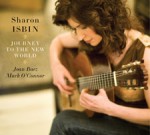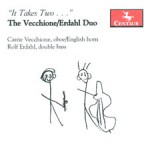Column Name
Title
Journey to the New World. Sharon Isbin with Joan Baez and Mark O’Connor. (Sony Classical 88697-45456-2)
Body
Joan Baez was one of guitarist Sharon Isbin’s childhood heroes, so perhaps it was inevitable that they would eventually collaborate, and the joyous results are at the heart of a new Sony CD, Journey to the New World. Baez adds haunting vocals on “Wayfaring Stranger,” which, thanks to arranger Carlos Barbosa-Lima, deftly steers away from treacle. She returns later in breathy, beautiful form for Isbin’s transcription of John Jacob Niles’s “Go ’Way From My Window.” Both make fine bookends to the Joan Baez Suite (2002) by John Duarte, who died in 2004. It’s a shame he didn’t live to hear this recording. Using roughly 12 of Baez’s songs, Duarte crafted a moody yet mellow tribute that shows off Isbin’s expertise. A high point comes in the bittersweet “Where Have All the Flowers Gone”: some arresting chord changes herald the traditional “Taps.”
Isbin, who founded and chairs Juilliard’s guitar department, begins the CD with four Renaissance duets, originally for lute and arranged for her playing both parts. Most impressive is the melodic invention of John Johnson’s “Greensleeves,” and I was struck by the haunting, anonymously attributed “Le Rossignol.” The generous disc also includes Andrew York’s brief Andecy, a popular valentine to folk music of the British Isles.
The program ends with Mark O’Connor’s Strings & Threads Suite, originally for violin solo, but here arranged for guitar and violin (the latter raptly played by O’Connor). Sections such as “Road to Appalachia” and “Texas Dance Hall Blues” are typical of its homey, exuberant channeling of folk tunes from Ireland and the United States. Throughout the program, Isbin’s warmth, vitality, and casual virtuosity infuse each track. Those who know Isbin only from her Bach, Rodrigo, or Villa-Lobos may be surprised by her naturalness in this repertoire. The recording engineers, Tim Martyn and Dann Michael Thompson, capture every pluck in vivid detail.
"It Takes Two…" The Vecchione/Erdahl Duo. (Centaur CRC 2942)
Quick! Name as many pieces as you can think of written for double bass and oboe. Sorry, time’s up, but never mind: here come oboist Carrie Vecchione and bassist Rolf Erdahl to the rescue, with “It Takes Two…”, an entire disc devoted to recent repertoire for those two instruments (with a “time-out” for English horn). In every track, Vecchione’s creamy piquancy makes an ideal foil for Erdahl’s gruff ardor.
Three compositions by Tim Goplerud, who earned a master’s degree in double bass from Juilliard and now works in the School’s I.T. Department, show the composer’s feeling for jazz, as well as his sensitivity to this duo’s coloristic extremes. There is something inherently humorous about these two instruments bonding together and Goplerud exploits this in Vignettes from The Miraculous Journey of Edward Tulane (2006), three short ruminations on Tulane, a porcelain rabbit. (I wouldn’t be surprised to find out that the composer likes Satie.) Rhumboid, also from 2006, is an adroit mix of rhumba and bebop, and the elegantly smoldering title track (for which Vecchione switches to English horn) was inspired by Astor Piazzolla’s tangos.
The balance of the program includes three miniatures by composer Dinos Constantinides, who earned a Juilliard Diploma in violin in 1960, Shane Monds, and Vernon J. Sandoz III, grouped as the Louisiana Suite, and pianist/composer Andrea Clearfield’s Three Songs for Oboe and Double Bass After Poems by Pablo Neruda (1997), climaxing with the dramatic counterpoint of “Every Day You Play.” In contrast to the disc’s lighter moments, Jody Nagel’s enigmatic Bedtime Stories (2003), a set of short works based on monsters in Greek mythology, stands out like a mournful dream.
Adrian Mann’s Canzone Vecchione (2005), crafted from five Italian folk songs as a birthday gift for the oboist’s father, ends this delightful, unusual project. The intimate recording, produced by the legendary Howard Scott (lured out of retirement for this project) and engineered by Eric Arunas at WFMT Studios in Chicago, has just enough space to place you in a comfy chair right in the room with the performers.






